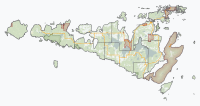Gore Bay | |
|---|---|
| Town of Gore Bay | |
 Panorama of Gore Bay and the North Channel. | |
| Motto(s): Pristine, prosperous, proud. | |
| Coordinates: 45°55′N 82°28′W / 45.917°N 82.467°W | |
| Country | Canada |
| Province | Ontario |
| District | Manitoulin |
| Government | |
| • Type | Town |
| • Mayor | Ron Lane[1] |
| • Governing Body | Corporation of the Town of Gore Bay |
| • MP | Carol Hughes (NDP) |
| • MPP | Michael Mantha (NDP) |
| Area | |
| • Land | 5.14 km2 (1.98 sq mi) |
| Elevation | 193.50 m (634.84 ft) |
| Population (2021)[2] | |
| • Total | 808 |
| • Density | 157.2/km2 (407/sq mi) |
| Time zone | UTC-5 (EST) |
| • Summer (DST) | UTC-4 (EDT) |
| Postal code | P0P 1H0 |
| Area code | 705 |
| Website | www.gorebay.ca |

Gore Bay became a town on 7 April 1890, on Manitoulin Island in Ontario, Canada. Located on Gore Bay, a bay of Lake Huron's North Channel, it is one of the two incorporated towns of Manitoulin District, of which it is the administrative and government seat. After the Treaty of 1862, Manitoulin Island was open for white settlement. Small towns began to emerge from the wilderness, and hotels were developed to provide lodgings for prospective land purchasers. This led to the formation of the town Gore Bay. The town's name is believed to be referencing the gore-shaped harbour. Other theories for the namesake are probably for Francis Gore (1769–1852), Lieutenant-Governor of Upper Canada from 1806 to 1817, or after the steamer Gore (c. 1839 and scrapped 1861[4]), which ran between Sault Ste. Marie and Collingwood from 1860 to 1870.
Boats were regularly travelling from Sault Ste. Marie, Collingwood, and Owen Sound; establishing regular ports of call on Manitoulin Island, specifically Gore Bay, and prospering hotels due to increased traffic. The new hotel industry in Gore Bay welcomed commercial travellers, fishermen, doctors, lumbermen and tourists.
Three hotels served Gore Bay for many years:
- The Atlantic Hotel
- The Campbell House, located on the harbour
- The Ocean House and Pacific Hotel
Community life in Gore Bay has always been closely connected to water, in fact before roads were built water was the only means available for travellers to get to the port of Gore Bay by boat. Boats would arrive and leave town with goods until the late 1950s, meaning the population was also quite low in the town's early years.
- ^ "2018 Municipal Election". Town of Gore Bay. Retrieved 12 November 2018.
- ^ a b "Gore Bay, Town (T), Ontario [Census subdivision] Census Profile, 2021 Census of Population". Statistics Canada. Retrieved 22 February 2022.
- ^ Cite error: The named reference
climatewas invoked but never defined (see the help page). - ^ "GORE (1839, Steamer)".

